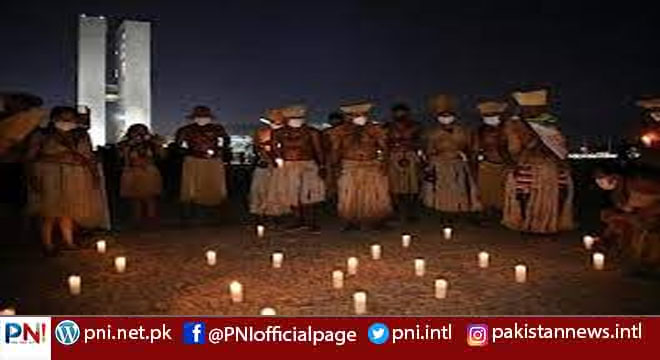Brasília, Aug 25 (AFP/APP):Thousands of indigenous protesters marched in the Brazilian capital Wednesday, bearing bows and arrows and traditional headdresses, as the Supreme Court prepared to take up a case that could eliminate reservations on their ancestral lands.
In what organizers say was the biggest indigenous protest ever in Brazil, an estimated 6,000 demonstrators marched to the high court as it began a session where it will consider a case that could remove protected status for some native lands, opening them to agribusiness and mining.
The protesters, who hail from more than 170 ethnic groups, were also fighting what they call systematic persecution under President Jair Bolsonaro since the far-right leader took office in 2019.
“This government is attacking indigenous peoples,” said Syrata Pataxo, a 32-year-old chief of the Pataxo people from the northeastern state of Bahia.
“Today all humanity is calling for the Amazon rainforest to be protected. But the government wants our rainforest, the lungs of the planet, to be replaced by soybeans and gold mining,” he told AFP, wearing elaborate body paint.
The protest started peacefully, with organizers urging demonstrators to avoid confrontations with police.
A similar protest in June erupted into clashes, with three indigenous demonstrators injured and three police wounded by arrows.
The court case revolves around the Brazilian constitution’s protection of indigenous lands.
The agribusiness lobby argues those protections should only apply to lands whose inhabitants were present in 1988, when the constitution was adopted.
Indigenous rights activists argue the constitution mentions no such cutoff date, and that native inhabitants have often been forced from their ancestral lands.
– ‘Brutally expelled’ –
The case involves a reservation in the southern state of Santa Catarina but will set legal precedent for similar cases across Brazil, experts say.
The plaintiffs are the Xokleng, Guarani and Kaingang peoples of the Ibirama-Laklano indigenous reservation, part of which lost its provisional protected status when a lower court ruled the groups were not living on the land in question in 1988.
They say that is because Brazil’s military dictatorship (1964-1985) forcibly removed them.
“During the dictatorship, the state sold our land to farmers. The reason we weren’t there (in 1988) is because they expelled us and forced us onto a tiny corner,” Ana Patte, a 29-year-old Xokleng activist, told AFP.
“Everyone knows how brutal the process of colonization was in Brazil…. They killed us as if we were insects they had to clean up so they could plant.”
– Legal onslaught –
The implications of the case are far-reaching.
Experts say it will set legal precedent for dozens — potentially hundreds — of similar cases, at a time when a powerful, Bolsonaro-backed agribusiness lobby has been aggressively moving to rewrite the rules on protected lands in Brazil.
The case echoes legislation before Congress that would enshrine the 1988 “time-frame argument” in law.
The bill is one of several that indigenous activists and environmentalists say Bolsonaro and his allies are trying to use to further the advance of agriculture and industry into Brazil’s rapidly disappearing forests.
Deforestation in the Brazilian Amazon has surged under Bolsonaro. In the 12 months through July, a total of 8,712 square kilometers (3,364 square miles) — an area nearly the size of Puerto Rico — of forest cover was destroyed, according to official figures.
Environmentalists say protecting indigenous reservations is one of the best ways to stop the destruction of the Amazon, a critical resource in the race to curb climate change.
Bolsonaro warned Tuesday that “chaos” would ensue if the court did not rule in favor of the 1988 cutoff.
“There’s land that’s productive today that could stop being productive…. It would be chaos for Brazil and a great loss for the world.”
But the 1988 cutoff is “unconstitutional,” said lawyer Samara Pataxo, legal adviser for the Association of Indigenous Peoples of Brazil (APIB).
“There’s nothing in the constitution that says indigenous peoples’ rights are limited to that date,” she told AFP.
Follow the PNI Facebook page for the latest news and updates.









